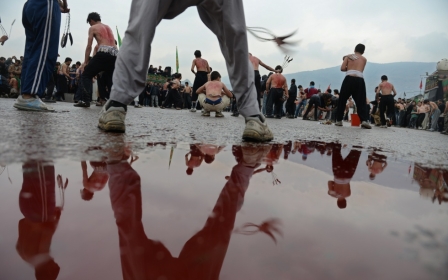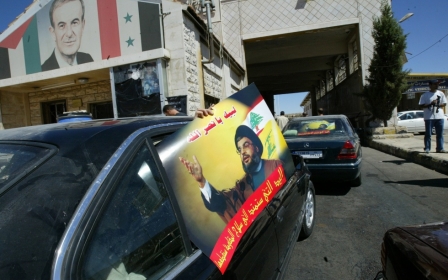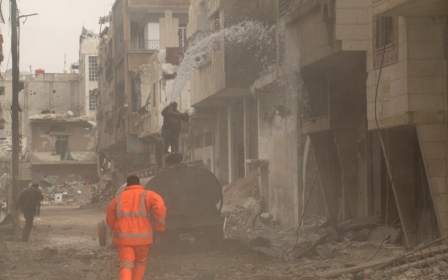Syrian opposition eyes new 'common ground' strategy

Syria's exiled opposition chief said on Thursday for the first time that President Bashar al-Assad's removal need not be a pre-condition for peace talks.
Speaking to AFP in Paris, opposition National Coalition chief Khaled Khoja said a "new strategy" was needed and that while Assad's overthrow was still the final aim, it was not necessary for the start of a process to end Syria's conflict.
"We insist on the goal of toppling Assad and the security services ... It is not necessary to have these conditions at the beginning of the process, but it is ... necessary to end the process with a new regime and a new free Syria," he said.
Khoja also softened the coalition's previous refusal to work with Damascus-tolerated opposition groups, saying he wants "a common ground" with other dissidents and to "establish a new framework for the Syrian opposition."
The country's main domestic opposition group, the National Coordination Committee for Democratic Change (NCCDC), said Khoja's comments marked a welcome change.
"Any statement calling for the unification of the opposition is certainly positive, but concrete actions and effective positions are more important," NCCDC spokesman Monzer Khaddam said.
He also praised the coalition for being prepared to drop its pre-condition for Assad to step down, saying the issue had been raised in joint opposition talks in Paris two weeks ago.
"We tried in Paris to convince them that all pre-conditions in no way help in finding a political solution in Syria," Khaddam said.
For the first time in Syria's war, the two groups agreed on a draft roadmap for future negotiations with Assad's representatives.
'Preserve the Syrian state'
Khoja also said that while the opposition's main demand is the ousting of Assad, it wants to "preserve the Syrian state".
"Unfortunately, the state is being demolished by the regime. Half of the hospitals have been demolished. More than half the schools have been demolished," said Khoja, who has lived in Turkey since the 1980s, after being imprisoned by the regime twice over his political activism.
Khoja blamed Assad for the rise of IS. "The roots of terror," he said, are "Bashar's intelligence services."
Khoja also said the West should have done more to stop Assad early on in the conflict in order to stem the rise of militant groups.
"Our Western friends have been informed since the end of 2011 that Al-Qaeda (members) were being released from (regime) jails," he said.
"Unfortunately, our Western allies just watched ... and we ended up where we are now, fighting ISIS, the most horrible terrorist organisation in history," he added.
Syrian opposition groups and activists have frequently accused Damascus of allowing the spread of militant groups such as IS, as a way to give credence to its claim that there was never a true pro-democracy movement seeking Assad's removal.
Kerry: military pressure on Assad to negotiate
Khoja met the French president Francois Hollande for the first time on Thursday, who said that Assad is "the main cause of his people's suffering, and for the rise of terrorist groups in Syria".
"He is therefore not a credible interlocutor to fight against Daesh and prepare Syria's future," Hollande added, using an alternative name for IS.
In Saudi Arabia to meet with Gulf allies, US Secretary of State John Kerry upped pressure on Assad to negotiate, saying he had "lost any semblance of legitimacy" and raising the possibility of military pressure.
"Ultimately a combination of diplomacy and pressure will be needed to bring about a political transition. Military pressure particularly may be necessary given President Assad's reluctance to negotiate seriously," Kerry told reporters in Riyadh.
Moscow meanwhile said it would host talks between representatives of Assad and opposition figures in April, three months after a meeting between the parties ended without any concrete results.
Russian officials said "a larger section of the Syrian opposition" was expected to take part and that members of the Coalition were considering attending.
US will not take eye off Iran's 'destabilising' acts
Russia - along with Iran and Lebanon's Shiite group Hezbollah – has given Assad continuous military and political support since the uprising against his rule began in 2011.
Kerry said the US is keeping an eye on Iran's "destabilising" acts while the two nations try to reach a deal on Tehran's nuclear programme.
"Even as we engage in these discussions with Iran around this programme, we will not take our eye off Iran's destabilising actions in places like Syria, Lebanon, Iraq and the Arabian Peninsula, Yemen particularly," he told reporters in Riyadh.
Kerry underscored that "we are not seeking a grand bargain".
"Nothing will be different the day after this agreement, if we reach one, with respect to any other issues that challenge us in this region, except we will have taken steps to guarantee that Iran will not have a nuclear weapon."
Whether or not there is a deal, the US will be fully committed to addressing other issues with Iran, "including its support for terrorism," he said.
Heavy fighting in Aleppo
Meanwhile Syria's second city Aleppo saw fierce clashes between pro-Assad forces and rebels near an air force intelligence headquarters that the opposition tried to seize in a spectacular attack on Wednesday.
The attack, which began with a powerful blast from explosives in a tunnel dug near the building, left at least 20 members of security forces and 14 rebels dead.
A Syrian military source told AFP the army had on Thursday launched an attack "against (rebel) gunmen positions" in the area, "killing and wounding many of them".
Pro-Assad forces also struck rebel-held territory in the east of the city, killing at least 22 civilians, including three children, in a single barrel bomb attack, said the Syrian Observatory for Human Rights, a monitoring group.
The violence this week in Aleppo has dampened hopes of a ceasefire in the city, where UN envoy to the Syrian conflict Staffan de Mistura has been seeking a halt to fighting as a first step towards humanitarian aid deliveries in the area and a broader political deal.
"De Mistura is at an impasse and is facing a dead end," Samir Nashar, a member of the National Coalition, told AFP. "De Mistura's initiative does not address even the minimum of rebel demands."
Khoja said that the UN plan to freeze the fighting in the main northern Syrian city of Aleppo is "extremely difficult" to implement because "the regime does not respect its commitments".
They "didn't have a clear response and reaction to war crimes committed by the regime, when the regime used chemical weapons against civilians, when the regime sent Scud missiles to urban areas including Aleppo," he said.
New MEE newsletter: Jerusalem Dispatch
Sign up to get the latest insights and analysis on Israel-Palestine, alongside Turkey Unpacked and other MEE newsletters
Middle East Eye delivers independent and unrivalled coverage and analysis of the Middle East, North Africa and beyond. To learn more about republishing this content and the associated fees, please fill out this form. More about MEE can be found here.




